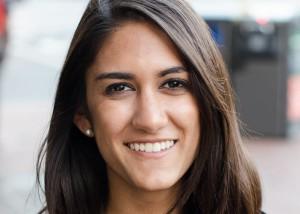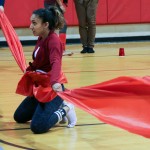
There’s not much I could say about the current Ebola outbreak that hasn’t already been articulated yet. There’s already the voice of the hypochondriacs who think every sneeze in a public space is a risk of infection; the passive naysayers who think we’re all just being ridiculous; U.S. President Barack Obama, who said Wednesday he felt safe enough to “hug and kiss” the medical staff who cared for an Ebola patient; and then the news junkies (me, and probably you) who are helplessly addicted to any headline with the world “Ebola” in it.
But then there’s my family friend Shawn Kripalani, a sophomore at Emory University who took a Snapchat video Wednesday night of Amber Vinson, a Dallas health care worker who was diagnosed with Ebola Wednesday, being transported to Atlanta’s Emory University Hospital in an ambulance. Vinson, 29, is one of several people to be treated within the United States for the disease, the second case since Thomas Eric Duncan was the first person to succumb to the disease on American soil.
[rawr][/rawr]
For as long as I’ve known Shawn, which is before either of us can remember, he’s been a nerd about medicine — fascinated by the most basic functions of the body and incredibly engaged in the nuances of various medical processes. So as a pre-med student living just a short walk away from the state-of-the-art isolation unit where three Ebola patients have been treated, I figured he’d have an interesting perspective on the fourth patient’s arrival.
When I called him to ask how he felt about all the Ebola hype on his campus, he answered the phone and violently coughed into my ear.
“Sorry, I have Ebola,” he said jokingly, but then rightfully acknowledged that such jokes could very soon not be funny anymore considering how this outbreak has started seeping into the United States.
As an aspiring surgeon, Shawn said he is fascinated by the idea of having the Ebola patients on his campus, and he loves the credibility it gives Emory University in terms of its health care abilities. But, as an everyday person, he said the proximity at which this virulent disease is being treated creates an “underlying fear” around campus.
“It’s obviously a stupid fear,” he said. “But we’ve grown up watching movies and reading books that exploit the idea of viruses getting out of control, so it’s not unusual for that thought of ‘what if this actually happens’ to be in the back of our heads.”
Despite the double-layered gloves, the neck hoods and the fluid-resistant gowns that the Centers for Disease Control and Prevention requires all doctors to wear while treating an Ebola patient, as of Oct. 8, more than 400 health care workers in West Africa have been infected with Ebola during the current outbreak, and 233 have died, according to an Wednesday New York Times fact sheet. The CDC said these high rates of infection could be attributed to shortages or improper use of protective equipment or a lack of medical personnel.
Shawn said the fact that Ebola patients are being treated on campus is very apparent and has become a topic that people use to fill blank space in conversation.
“As a medical junkie…it’s amazing that a disease I read about in textbooks has now come alive on my campus,” he said. “You can learn about a disease in a textbook about what it does and how it presents its symptoms, but to see it cared for so delicately and what we have to do to control it is a whole different story.”
As of Thursday, five Americans have contracted Ebola after working overseas, a seemingly insignificant comparison to the hundreds infected in Africa. But, as we all have seen, an American coming back to the United States after treating or covering the underprivileged for the disease and then contracting the disease, is just the perfect equation for a captivating public-health drama.
“News trucks and medical trucks are always all over the place [at Emory],” Shawn said. “I get why they need to be there, but sometimes it’s annoying when they block off part of campus and I need to get to class.”
With the constant news coverage and all the hype, we can all see that this outbreak has its inherent cinematic qualities. Who would have thought that Ebola would go from this archaic and seemingly fictional disease to a Snapchat spectacle right on our phones?












